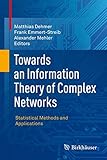Towards an Information Theory of Complex Networks : Statistical Methods and Applications / edited by Matthias Dehmer, Frank Emmert-Streib, Alexander Mehler.
Tipo de material: TextoEditor: Boston : Birkhäuser Boston, 2011Edición: 1Descripción: xvI, 395 páginas 114 ilustraciones recurso en líneaTipo de contenido:
TextoEditor: Boston : Birkhäuser Boston, 2011Edición: 1Descripción: xvI, 395 páginas 114 ilustraciones recurso en líneaTipo de contenido: - texto
- computadora
- recurso en línea
- 9780817649043
- Q350-390
Springer eBooks
Preface -- Entropy of Digraphs and Infinite Networks -- An Information-Theoretic Upper Bound on Planar Graphs Using Well-orderly Maps -- Probabilistic Inference Using Function Factorization and Divergence Minimization -- Wave Localization on Complex Networks -- Information-Theoretic Methods in Chemical Graph Theory -- On the Development and Application of Net-Sign Graph Theory -- The Central Role of Information Theory in Ecology -- Inferences About Coupling from Ecological Surveillance Monitoring -- Markov Entropy Centrality -- Social Ontologies as Generalizedd Nearly Acyclic Directed Graphs -- Typology by Means of Language Networks -- Information Theory-Based Measurement of Software -- Fair and Biased Random Walks on Undirected Graphs and Related Entropies.
For over a decade, complex networks have steadily grown as an important tool across a broad array of academic disciplines, with applications ranging from physics to social media. A tightly organized collection of carefully-selected papers on the subject, Towards an Information Theory of Complex Networks: Statistical Methods and Applications presents theoretical and practical results about information-theoretic and statistical models of complex networks in the natural sciences and humanities. The book's major goal is to advocate and promote a combination of graph-theoretic, information-theoretic, and statistical methods as a way to better understand and characterize real-world networks. This volume is the first to present a self-contained, comprehensive overview of information-theoretic models of complex networks with an emphasis on applications. It begins with four chapters developing the most significant formal-theoretical issues of network modeling, but the majority of the book is devoted to combining theoretical results with an empirical analysis of real networks. Specific topics include: chemical graph theory ecosystem interaction dynamics social ontologies language networks software systems This work marks a first step toward establishing advanced statistical information theory as a unified theoretical basis of complex networks for all scientific disciplines. As such, it can serve as a valuable resource for a diverse audience of advanced students and professional scientists. It is primarily intended as a reference for research, but could also be a useful supplemental graduate text in courses related to information science, graph theory, machine learning, and computational biology, among others.
Para consulta fuera de la UANL se requiere clave de acceso remoto.


